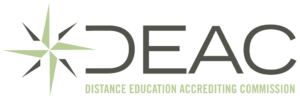Grading
Policy
Acacia University uses the following system of course grading (no rounding):
A = 92 – 100%
B = 84% – 91.99%
C = 76% – 83.99%
D = 65% – 75.99%
F = 64.99% or lower
Incomplete – During the semester, if a student has an extenuating or personal circumstance that prohibits him/her from completing the course within the posted schedule, special arrangements to complete the work must be made with the instructor and are granted on an individualized basis. If a student does not complete the assigned course work within the agreed upon schedule, the course grade will be based on the grade earned as of the scheduled deadline. If less than 31 nine lessons have been completed, the student may be granted a chance to re-take the course during the next semester. Grades of “D” or “Failing” do not earn credits that apply toward a graduate degree.
If circumstances occur during the semester that prohibits the student from completing the course, he/she may complete during the next academic semester.
Grades are also calculated in terms of a 4-point grade system:
A = 4.00 points
B = 3.00 points
C = 2.00 points
D = 1.00 points
F = 0.00 points
A student may earn as many as two grades of “C” but must balance the grades with at least two grades of “A” to achieve the minimum required grade average. A student must achieve a minimum of a 3.00 cumulative grade point average (GPA) to graduate with the graduate degree.
Quizzes, mid-term exams, and final exams are administered electronically. These assessments are system scored and students can view their grade immediately upon submission. Quizzes are allotted 30-60 minutes and mid-term and final exams are allotted 60-120 minutes, depending on the course. There are many types of assignments used in Acacia courses. A few are described below:
- Checkups are short essay-type questions. These assignments require one to three written paragraphs with careful professional thought including insight and classroom application.
- Virtual Learning Community (VLC) activities are interactive forum-based assignments. These assignments represent interactive discussions among participants. Students must answer a question based on the lesson topic. Each student is then required to respond to two of their classmates’ original posts, offering insightful feedback, comments, suggestions, etc. Grades are given for the student’s answer as well as their responses to classmates.
- Strategy Plans: As part of the coursework in the three Power Strategies® courses, you will be asked to complete several strategy plans. These plans will demonstrate how you are integrating the Power Strategies® into your daily instruction.
- Literature Reviews: Literature reviews are common assignments in graduate courses. They are designed to strengthen research skills while the individuals extend and deepen their knowledge on a specific topic related to the course. Literature reviews have characteristics that enhance critical thinking skills and writing clarity. APA formatting is required.
- Projects: A project requires that you collect information regarding a topic, analyze the information, apply the course content, and design a plan that you can use in your classroom. Projects allow you to demonstrate a high level of skill in the application of the concepts of a course. There are several projects that are included in the courses.
Each assignment has a specific rubric. The rubrics are set up to provide a detailed explanation of all expectations. All instructors use this tool to objectively. Rubrics are found on the home page as well as each course page. Reviewing and using these rubrics while completing each assignment will help to ensure optimum points are earned.
Proctored exams are required to assure that the degree candidate has personally fulfilled the degree requirements. A student’s achievement will be assessed by an appropriate number of proctored examinations spaced throughout the program of study. All proctoring is performed by an administrator of the school where the student is employed or has verifiable permission to access classrooms. Should the student being proctored not be employed in a school, the student must present a photo ID for the proctor to verify identity and authorize assessment activities. Proctors shall use valid government-issued photo identification to confirm the student’s identity. This information must be sent to the Professor/instructor.
Administrative authorization forms are provided in various courses for fieldwork observations, case studies, etc. Specific proctored examinations used in the master’s degree programs are as follows:
- EDC510 Power Strategies for Classroom Assessment and EDC520 Power Strategies for Improving Comprehension require that each student have a proctor visit his/her classroom and verify evidence of using the course strategies. The proctor completes a survey and verification form and submits it directly to the Acacia instructor.
- EDC610 Portfolio Project requires an authorization form signed by an administrator since surveying, observations, and use of school data may be required.
- EDC620 Mentored Practicum requires a verification of mentoring form signed by an administrator. The verification authorizes the student to conduct mentoring at the school. The mentor, mentee, and administrator sign a second form showing agreement regarding the mentoring activities to be conducted during the six weeks of onsite mentoring. A classroom observation and/or discussion with the student regarding the use of strategies is documented on a form that is signed by the proctor and returned to the Acacia instructor. A written and oral summary of the mentoring process is presented to the proctor following the activity. Acacia receives a copy of the summary and verification from the proctor regarding the presentation.
- The proctor is a verified supervisor of the student.
- The identity of the student has been verified by the proctor.
- Signed authorization and verification forms are submitted to the Professor/instructor before and after each proctored assessment.
- Depending on the graduate program, proctoring occurs in a minimum of 4 courses. All fieldwork, Mentored Practicum, and action research projects are authorized and approved by school administration where the student is employed.






